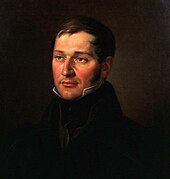Andrzej Towiański

Andrzej Tomasz Towiański (Polish pronunciation: [anˈdʐej tɔˈvʲaɲskʲi]; January 1, 1799 – May 13, 1878) was a Polish philosopher and messianic religious leader.
Life

Towiański was born in Antoszwińce, a village near Vilnius, which after Partitions of Poland belonged to the Russian Empire. He was the charismatic leader of the Towiańskiite sect, known also as Koło Sprawy Bożej (the Circle of God's Cause). In 1839 he experienced a vision in which the Holy Ghost and the Virgin Mary urged him to act as a messenger of the Apocalypse.[1] The Poles, the French—particularly Napoleon—and Jews were to play leading roles.[1] Among those influenced by his thinking were the Polish Romantic poets Adam Mickiewicz, Juliusz Słowacki, and Seweryn Goszczyński.[2]

His extraordinary influence on Mickiewicz, a leader of the Polish emigre community, was divisive, and some members of the community accused him of being a Russian agent.[3]
He died in Zurich.
See also
- History of philosophy in Poland (Messianist period)
- List of Poles
Footnotes
- ^ a b Eugen Weber (2000). Apocalypses: Prophecies, Cults, and Millennial Beliefs Through the Ages. Harvard University Press. p. 128. ISBN 978-0-674-00395-8.
- ^ "Adam Mickiewicz: His Life and Work". University of Glasgow Faculty of Arts. Archived from the original on 2011-06-07. Retrieved 2010-04-27.
- ^ Stephen A. Kippur (1981). Jules Michelet, a study of mind and sensibility. SUNY Press. p. 93. ISBN 978-0-87395-430-3.
External links
- Works by Andrzej Towianski at Project Gutenberg
- Works by or about Andrzej Towiański at the Internet Archive
- Dr Pavel Zahradník: Odkud přišli starší bratři?. Te Deum. 3/2009 (in Czech)
